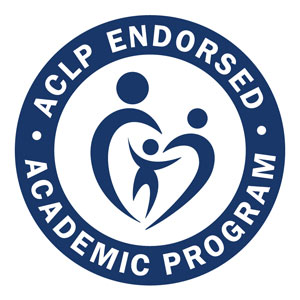The Department of Human Development and Family Science curricula are designed to develop a multidisciplinary perspective on the study of individuals and families across the life span. With an emphasis on the practical implications of scholarly knowledge, HDFS offers a course of study to prepare students for a variety of careers with children, parents, couples, and families.
In order to provide both structure and flexibility to accommodate varied professional interests, students can earn their Bachelor of Science in Human Development and Family Science with an option in Child Life or Early Child Development. The specific professional options are listed below.
The Early Child Development prepares students to work directly with or for the benefit of children age 6 and younger. Students interested in this area of study will gain knowledge of early childhood development, professional child care, and educational programs for young children as well as skills for working with children who are in the preschool years. Specifically, students will learn how to understand, guide and teach young children, and they will gain experience to prepare for careers in early childhood settings, such as childcare centers, preschools, or Head Start classrooms, administration of early childhood programs, daycare licensing, training and consulting. Daycare‐based internships must be in programs that are accredited or in the process of accreditation through NAEYC, NAC, NECPA or similar organizations.
The B.S. Human Development and Family Science Early Child Development program at Auburn University is accredited by the Commission on the Accreditation of Early Childhood Higher Education Programs of the National Association for the Education of Young Children. The current accreditation term runs from July 2021-July 2028.
View Curriculum Sheet
View NAEYC Program Outcome Data
View NAEYC Data Summary
View HDFS ECD Assesment Report
The Child Life prepares students to work with or for the benefit of children with specific medical needs and their families. Completion of this concentration meets the minimum course requirements for national certification as a Child Life Specialist through the Child Life Council (CLC).
In order to achieve certification, students will have to complete pre‐internship practicum hours, an approved internship under a Certified Child Life Specialist (CCLS) in a hospital‐setting and successfully pass the Child Life Professional Certification Examination after graduation. Practicum and internship placements are highly competitive and students must take initiative to be successful. More information on the Child Life profession and certification can be found on the Child Life Council’s website at www.childlife.org.

Child Life Undergraduate Option Application for Admission
Clinical Hour Verification Form
View Curriculum Sheet
Health & Human Development
View Curriculum Sheet
A minor in HDFS is also offered and open to all Auburn University undergrads. Students take two core courses and 12 additional hours of HDFS courses to earn the minor and enhance career preparation.
View Curriculum Sheet